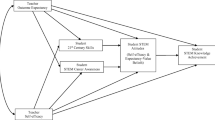Abstract
The effects of experience on attitudes toward computers and judgments of confidence, or self-efficacy, for specific computer technologies were investigated. Thirty-two students in a “computer applications in physical education” course participated in the study. The Computer Technologies Survey was used as a pretest and posttest measure to assess students' attitudes toward computers and perceived self-efficacy for electronic mail (e-mail) and word processing. Treatment conditions required the students to communicate with the instructor via e-mail, a word-processed note, or handwritten note. These conditions manipulated experience with e-mail and word processing while keeping instructor-student interaction constant. Students' judgments of computer capability significantly increased from pretest to posttest across all treatments. A direct relationship between time-on-task and levels of confidence was not found which suggests that “quality” rather than “quantity” of computer experience may be most critical.
Similar content being viewed by others
References
Bandura, A. (1977). Self-efficacy: Toward a unifying theory of behavioral change.Psychological Review, 84, 191–213.
Bandura, A. (1988). Organizational applications of social cognitive theory.Australian Journal of Management, 13, 275–302.
Bandura, A., & Adams, N. E., & Beyer, J. C. (1977). Cognitive processes mediating behavioral change.Journal of Personality and Social Psychology, 35, 125–139.
Cambre, M. A., & Cook, D. L. (1985). Computer anxiety: Definition, measurement, and correlates.Journal of Educational Computing Research, 1, 37–54.
Campbell, N. J., & Williams, J. E. (1990). Relation of computer attitudes and computer attributions to enrollment in high school computer courses and self-perceived computer proficiency.Journal of Research on Computing in Education, 23, 276–289.
Chen, M. (1986). Gender and computers: The beneficial effects of experience on attitudes.Journal of Educational Computing Research, 2, 265–282.
D'Souza, P. V. (1991). The use of electronic mail as an instructional aid: an exploratory study.Journal of Computer-Based Instruction, 18, 106–110.
Farina, F., Arce, R., Sobral, J., & Carames, R. (1991). Predictors of anxiety towards computers.Computers in Human Behavior, 7, 263–267.
Ferguson, G. A. (1976).Statistical analysis in psychology and education (4th ed.). New York: McGraw-Hill.
Gist, M. E., & Mitchell, T. R. (1992). Self-efficacy: A theoretical analysis of its determinants and malleability.Academy of Management Review, 17, 183–211.
Gist, M. E., Schwoerer, C., & Rosen, B. (1989). Effects of alternative training methods on self-efficacy and performance in computer software training.Journal of Applied Psychology, 74, 884–891.
Hill, T., Smith, N. D., & Mann, M. F. (1986). Communicating innovations: Convincing computerphobics to adopt innovative technologies.Advances in Consumer Research, 13, 419–422.
Hill, T., Smith, N. D., & Mann, M. F. (1987). Role of efficacy expectations in predicting the decision to use advanced technologies: The case of computers.Journal of Applied Psychology, 72, 307–313.
Holzinger, S. K. (1992). A model for a hospitality computer literacy course.Hospitality and Tourism Educator, 4(2), 53–57.
Jones, P. E., & Wall, R. E. (1990). Components of computer anxiety.Journal of Educational Technology Systems, 18, 161–168.
Kinzie, M. B., & Delcourt, M. (1991).Computer technologies in teacher education: The measurement of attitudes and self-efficacy. Paper presented at the annual meeting of the American Educational Research Association, Chicago. (ERIC Document Reproduction Service No. ED 331 891)
Kinzie, M. B., & Delcourt, M. (1992).Computer technologies: Attitudes and self-efficacy across undergraduate disciplines. Manuscript in preparation.
Koohang, A. A. (1987). A study of the attitudes of pre-service teachers toward the use of computers.Educational Communication and Technology Journal, 35, 145–149.
Koohang, A. A. (1989). A study of attitudes toward computers: Anxiety, confidence, liking, and perception of usefulness.Journal of Research on Computing in Education, 22, 137–150.
Loyd, B., & Gressard, C. (1984).The effects of sex, age, and computer experience on computer attitudes. Paper presented at the Annual Meeting of the Eastern Educational Research Association of West Palm Beach, FL. (ERIC Document Reproduction Service No. ED 246 878)
Mager, R. F. (1992). No self-efficacy, no performance.Training, 29(4), 32–36.
Miura, I. T. (1986).Computer self-efficacy: A factor in understanding gender differences in computer course enrollment. Paper presented at the annual meeting of the American Educational Research Association, San Francisco. (ERIC Document Reproduction Service No. ED 271 104)
Murphy, C. A., Coover, D., & Owen, S. (1988).Assessment of Computer Self-Efficacy: Instrument development and validation. Paper presented at the annual meeting of the National Council on Measurement in Education, San Francisco. (ERIC Document Reproduction Service No. ED 307 317)
Okebukola, P. A., Sumampouw, W., Jegede, O. J. (1992). The experience factor in computer anxiety and interest.Journal of Educational Technology Systems, 20, 221–229.
Schunk, D. H. (1989a). Self-efficacy and cognitive skill learning. In C. Ames, & R. Ames (Eds.),Research on motivation in education: Vol. 3. Goals and Cognitions. San Diego: Academic Press.
Schunk, D. H. (1989b). Social cognitive theory and self-regulated learning. In B. J. Zimmerman, & D. H. Schunk (Eds.),Self-regulated learning and academic achievement: Progress in cognitive development research, (pp. 83–110). New York: Springer-Verlag.
Weil, M. M., Rosen, L. D., & Wugalter, S. E. (1990). The etiology of computerphobia.Computers in Human Behavior, 6, 361–379.
Author information
Authors and Affiliations
Rights and permissions
About this article
Cite this article
Ertmer, P.A., Evenbeck, E., Cennamo, K.S. et al. Enhancing self-efficacy for computer technologies through the use of positive classroom experiences. ETR&D 42, 45–62 (1994). https://doi.org/10.1007/BF02298094
Issue Date:
DOI: https://doi.org/10.1007/BF02298094




